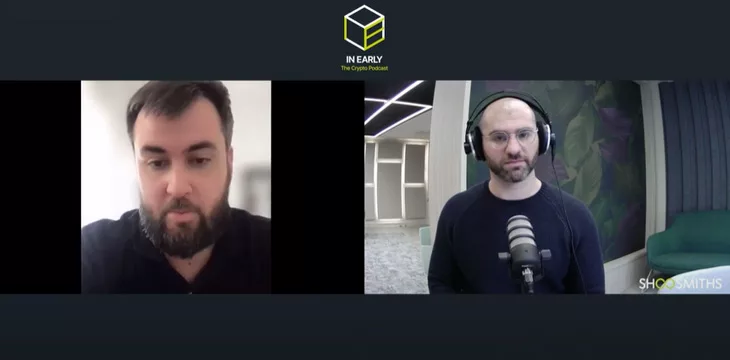|
Getting your Trinity Audio player ready...
|
Nick Smart was recently interviewed on the In Early podcast hosted by Matt Green, Blockchain Litigation Lead at Shoosmiths. Smart gave his views on Bitcoin as a technology, as well as some of the legal issues surrounding Dr. Craig Wright, Tulip Trading vs. BTC Core developers, and more.
Bitcoin fundamentals
The interview begins with Green asking Smart for an overview of Bitcoin. He characterizes it as a digital currency secured by cryptography. More specifically, it is a peer-to-peer electronic cash system.
Moving on to proof-of-work, Smart explains that it’s a way of securing the Bitcoin network. It helps confirm that Nick sent Matt a transaction. Computers solve a math puzzle, and whoever wins builds the next block, so they get to say what the correct version of events is. They also get a reward (the block subsidy) and any transaction fees in the block. Proof of work helps keep the Bitcoin network safe and secure, and you need more than 50% of the hash power to attack it. Readers interested in a more in-depth look at proof of work can read this article.
Tulip Trading vs. Bitcoin Association for BSV & Ors
After the initial explanation about Bitcoin, Green pivots to one of the legal cases surrounding Dr. Wright. He asks Smart who the claimant is and what his claim is.
Smart explains that the claimant is Dr. Craig Wright. He’s a computer scientist and businessman who “claims to be Bitcoin’s inventor”. Dr. Wright faces much opposition within the cryptocurrency industry, and some do not believe him, he says. Is he really Satoshi? Smart says nobody can know for sure as there is no conclusive evidence.
What is his claim in the Tulip Trading case? Smart explains that Tulip Trading owns a vast swathe of Bitcoins, but there was a sophisticated hack on his home network, and private keys to assets worth $3 billion were stolen from encrypted and protected files on Dr. Wright’s computer network. He discovered the hack when looking at other transactions, but the attacker had deleted his logs, taken the private keys, and stole some other information.
Dr. Wright wiped the hard drive without taking digital images of it, which could have provided forensic evidence of the attack. Smart admits we are all capable of acting emotionally in the moment, but he thinks the preservation of that evidence could have helped Dr. Wright’s case a lot. However, the attacker is in a strange position whereby they can’t move the stolen funds as it would be immediately noticeable.
While all of the details will become clear as the case goes on, essentially, the hack has deprived Dr. Wright of his assets and their private keys. Smart points out something important here: the case does not rest on Dr. Wright proving he had control of specific private keys. Rather, it rests on him proving he had control of these Bitcoins at any point in time.
What does Dr. Wright want developers to do? He wants them to write a patch that would enable Tulip Trading to regain control of the assets.
Smart points out that while there is much grumbling about this in the cryptocurrency space, there is precedent. When the Ethereum DAO was hacked, developers applied a patch and recovered stolen Ethereum. Previous bugs in BTC were also patched. Therefore, Dr. Wright is asking for something that is technically possible.
However, some developers might not want to do this and may be legally compelled to do so. Is such a legal order enforceable internationally? Smart doesn’t know, but he does acknowledge that it could create another hard fork in the BTC network. For now, the defendants are claiming that miners would ignore any proposal they make, but time will tell if that’s so.
So, it can be done, but should it?
The interview then strays into more moral/philosophical territory. Green poses the question of whether something should be done just because it can be done.
Smart recognizes that the assets in the identified wallets are worth billions, and applying a patch may cause them to lose significant value if many people decide to sell once it is applied.
Furthermore, in some people’s view, Tulip Trading’s request “goes against the spirit of Bitcoin,” Smart says. Of course, Dr. Wright would disagree, saying that being able to recover stolen property is perfectly in alignment with what Bitcoin is about, even if others have misunderstood it.
Whether people like Dr. Wright or not, a lot of what he says makes sense, and whether this should be done depends on whether he can prove he is the rightful owner of the assets, Smart concludes.
Looking at the potential implications of the case, Smart acknowledges they will be “huge” no matter what way it goes. As someone involved in digital asset recovery, he was to know what the standard of evidence for proving you own something is. He also notes that if Dr. Wright is successful, it will have implications for other situations in the industry: e.g., the victims of the QuadrigaCX scam and other crimes may attempt to recover their digital assets by the same means.
Ultimately, there are still many unanswered questions, and this case should help answer some of them. Who is responsible for what? Which jurisdiction will have supremacy over legal orders? Are they enforceable internationally? What happens if some developers refuse to comply while others don’t? These questions all have to be answered, and they could even have implications beyond the blockchain space.
To learn more about the Tulip Trading legal action and its implications, read CoinGeek’s latest piece on how the conversation is starting to charge around the legal duties for blockchain developers.
Watch Ian Grigg: How I learnt the full story of Satoshi Nakamoto

 02-13-2026
02-13-2026 




